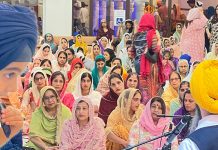
India state organised event bringing together 400 raagi on stage at Red Fort, New Delhi, to mark the birth of Guru Tegh Bahadur on 21 April 2022, with PM Narendra Modi as the guest of honour. -Photo: Videograb from video shared at Modi Facebook page
By Gurnam Singh | Opinion |
2024 marks the 40th anniversary of the declaration of war against the Sikh Punjabi nation by the forces of the Indian state. This began with the army assault on the Darbar Sahib in Amritsar and the deaths of thousands of civilians in what is infamously known as Operation Blue Star. This was followed by 10 years of state terror resulting in the extra judicial murders of thousands more of innocent people. The up shot of this oppression was a demand for a separate Sikh state in Northern India called Khalistan and a global Sikh liberation movement.
But tragically 38 years have passed and not only have we progressed little towards this ambition. Indeed, the dream of liberation is as elusive as ever, those guilty of extrajudicial killings of innocent Sikhs remain unpunished, the Sikh genocide of November 1984 remains acknowledged and Sikh political prisoners languish in jails despite having served many years in excess of their sentences.
There are many reasons why we appear to have failed in our quest for justice. Sikhs have no shortage of courageous warriors prepared to sacrifice their lives and livelihoods, but I would suggest the most significant reason for our failure is our unique capacity to be co-opted by the opposition.
One such example is the U.K. based self-proclaimed President of Khalistan in exile, Sewa Singh Lalli. Whilst I respect his past contribution to the Sikh liberation struggle, I was extremely disappointed to read a recent Facebook post by him in which he showered praise on Narendra Modi, the Indian Prime Minister and Home Minister Amit Shah for their service to Sikhs.
This praise comes against the background of political manoeuvres by the Indian intelligence agencies where meetings between the so-called Khalistanis and the Indian state have been taking place. I do not doubt the initial intentions of those Khalistani leaders, such as Sewa Singh Lalli and Ripudaman Singh Malik, who have in the past given much to the struggle for justice, but sadly, like a venus fly trap, though I may be wrong, on the surface it seems like, having been enticed with warm words and hospitality from Delhi, they have been become co-opted into the bigger Hindutva project.
This and other recent events surrounding the demise of the Akali Dal, RSS takeover of the SGPC, the closeness of Haryana SGPC President Baljit Singh Daduwaal and the huge BJP sponsored events held at the Red Fort, Delhi and Panipat, Haryana to commemorate the 400 Anniversary of the birth of Guru Tegh Bhadur Ji, have left many Sikhs wondering what their political future is! And the real danger is that fragmentation and factional infighting amongst Sikhs is likely to increase; and this can only benefit the Hindutva Indian state, which, like all imperial powers, thrives on a divide and rule strategy.
But the highly symbolic sight of self-proclaimed Khalistanis praising Modi and the BJP has brought the whole Khalistan movement into disrepute. It has left many wondering if these pronouncements are part of a deeper strategy by the Indian state, as was the case with the British before them, to cement its hegemony within Sikh Panthic circles.
I have no hesitation in speculating that the BJP, facilitated by the discredited former DSGPC President Manjinder Singh Sirsa, has not suddenly become receptive to the demand for Khalistan, but is more concerned with undermining Sikh demands for sovereignty whilst simultaneously extending the reach of the Indian Hindutva nationalist project. It’s worth noting that Panjab and Delhi are two states that have consistently rejected the BJP and, along with Haryana and Western UP, as we saw with the farmer’s movement, have formed the backbone of opposition to the Hindutva project.
So, what lesson can those like me who have and continue to fight for freedom, justice and self-determination in India and elsewhere take from the current maliase? There are many but, in the context of the current political game playing, perhaps we need to reflect on the words of the Roman statesman Marcus Tullius Cicero whose political thoughts shaped the formation of the Roman Empire.
An important lesson from history for us today: “A nation can survive its fools and even the ambitious. But it cannot survive treason from within. An enemy at the gates of the kingdom is less formidable, for he is known and carries his banner openly. But the traitor moves amongst those within the gates freely, his sly whispers rustling through all the alleys are heard and shared in the very halls of the government and hearts of the nation itself.”
Nothing changes, even today, but I can only pray and hope there are enough thinking Sikhs who can see and understand this game. And to those who want to pursue the path of dialogue with the Indian State, I say good luck; there is no harm in talking, our history teachers us to be strategic. However, please only offer praise when you have secured some meaningful concessions, otherwise, you simply disincentivise the Government from giving you anything at all and all our efforts will lead to nothing.

Gurnam Singh is an academic activist dedicated to human rights, liberty, equality, social and environmental justice. He is an Associate Professor of Sociology at University of Warwick, UK. He can be contacted at Gurnam.singh.1@warwick.ac.uk
* This is the opinion of the writer and does not necessarily represent the views of Asia Samachar.
RELATED STORY:
BJP all out celebrating Sikh occasions. What’s up? (Asia Samachar, 21 April 2022)
ASIA SAMACHAR is an online newspaper for Sikhs / Punjabis in Southeast Asia and beyond.Facebook | WhatsApp +6017-335-1399 | Email: editor@asiasamachar.com | Twitter | Instagram | Obituary announcements, click here |































